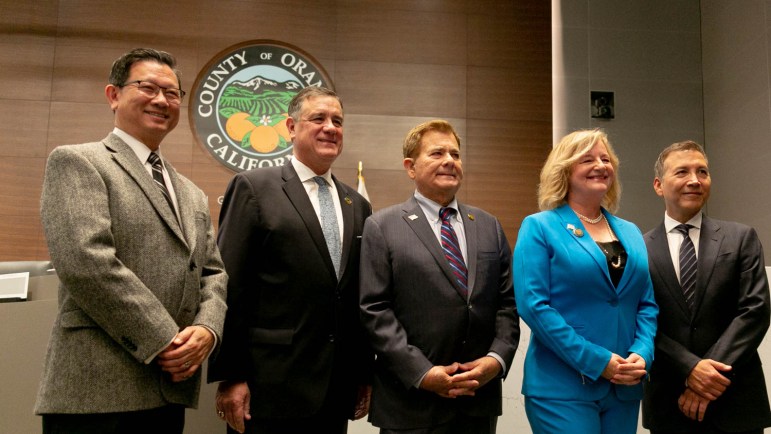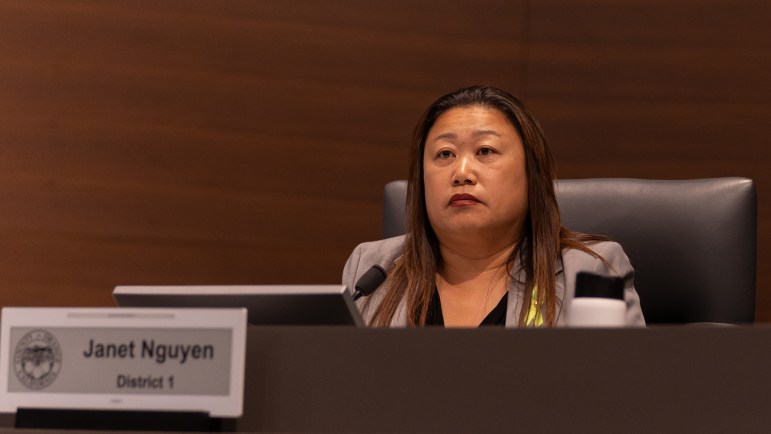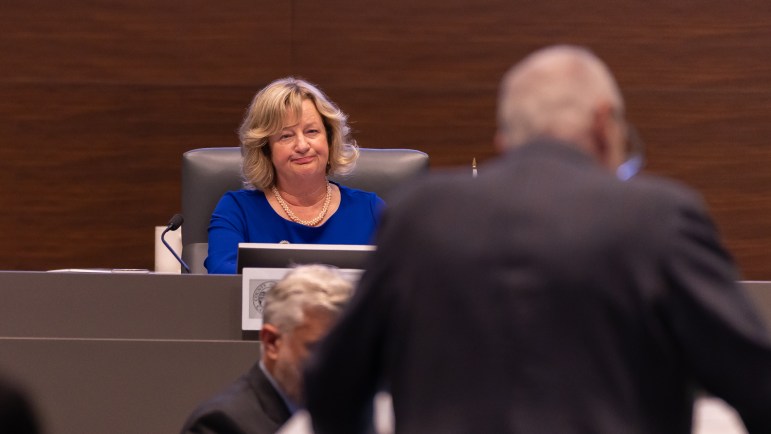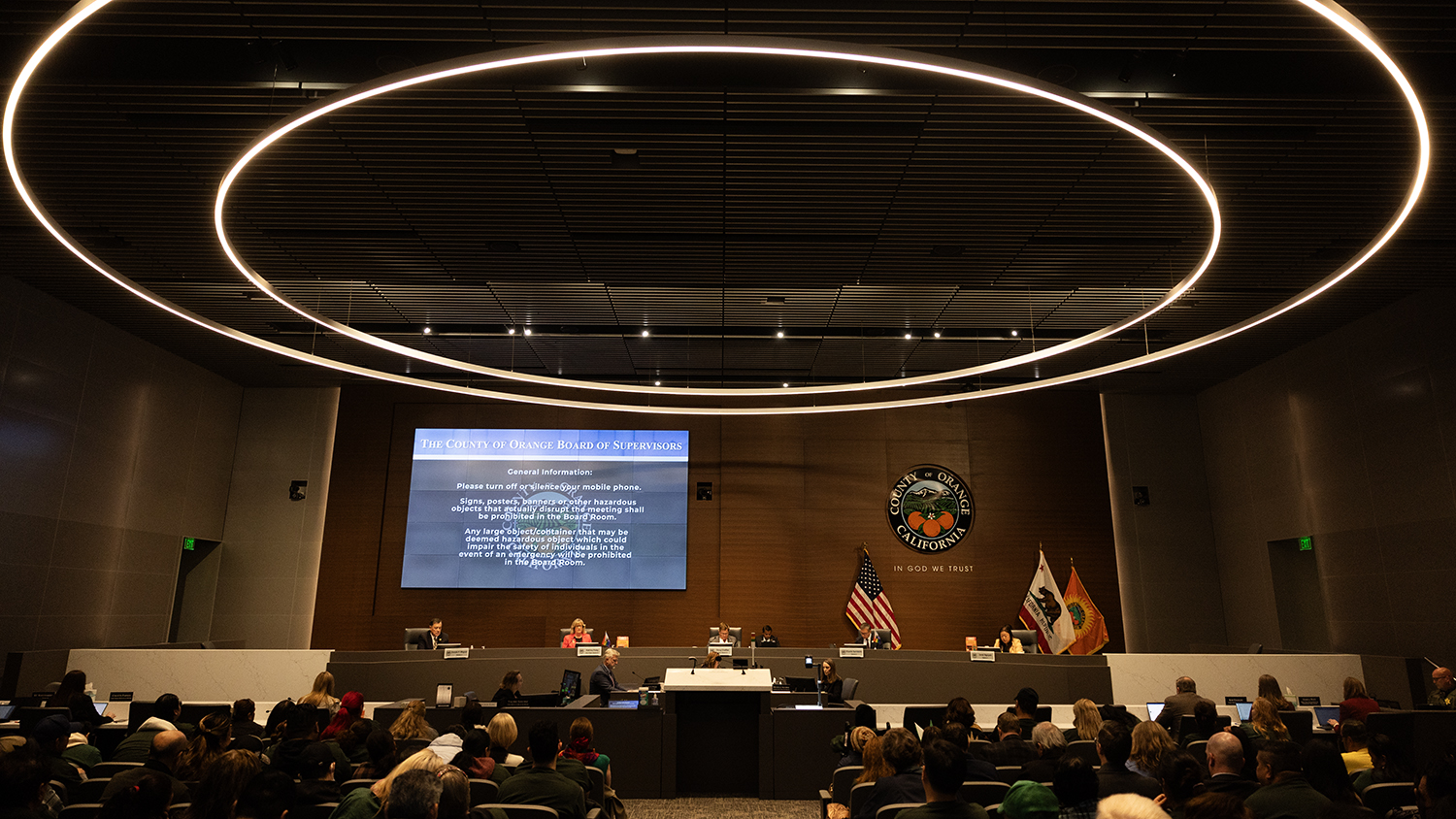Federal COVID-19 bailout funds inflated local tax coffers unlike anything in modern history.
Along with a host of money to local governments and nonprofits, local politicians across Southern California and San Diego got a turbo boost to the amount of money they get to distribute in their districts at their discretion.
In Orange County, it amounted to a one-time total of $13 million for each county supervisor – totalling nearly $53 million to date.
Yet today, amidst much tighter public budgets and in the wake of myriad COVID bailout spending scandals, there’s open questions as to how much local governments should put in the hands of politicians – if any at all.
There can be confusion about what discretionary funds even mean.
In Orange County, if you ask about this kind of funding, it often gets confused with event budgets that each supervisor gets within their office budget – now estimated at $200,000 for each office.
But between 2021 and 2023, county supervisors were granted about $13 million each to distribute in their districts as part of the COVID bailouts. Most supervisors have spent most of those funds while Supervisor Don Wagner only has spent just over half.
The big question is whether those kinds of allocations will remain going forward – especially after the scandal generated by former County Supervisor Andrew Do’s guilty plea earlier this year for bribery in connection with use of his discretionary funds.
 The new Orange County Board of Supervisors pose for photos on Tuesday, Jan. 10, 2023. From left: Republicans Andrew Do and Don Wagner, followed by Democrats Doug Chaffee, Katrina Foley and newly-elected Vicente Sarmiento. Credit: JULIE LEOPO, Voice of OC
The new Orange County Board of Supervisors pose for photos on Tuesday, Jan. 10, 2023. From left: Republicans Andrew Do and Don Wagner, followed by Democrats Doug Chaffee, Katrina Foley and newly-elected Vicente Sarmiento. Credit: JULIE LEOPO, Voice of OC
Over the next few months, heading into the public discussions about the County of Orange strategic financial plan, it will be interesting to see what kind of discretionary budgets Orange County Supervisors want to set for themselves.
Some, like the Orange County Register Editorial Board, derisively refer to discretionary funds for politicians as slush funds – as they clearly do allow elected leaders to distribute the spoils of public office.
Meanwhile, elected leaders across both political parties – like Orange County Democratic Supervisor Katrina Foley and Republican Supervisor Janet Nguyen – defend the idea of discretionary spending as a way to heighten local control because it offers a county supervisor the ability to respond to budget emergencies or opportunities in the district.
Yet that kind leeway is what got disgraced former Orange County Supervisor Do into deep trouble after he pleaded guilty to steering nearly $1 million in federal COVID funds – including discretionary funds –- back to himself in the way of bribes.
 Supervisor Janet Nguyen at the Orange County Board of Supervisors meeting on May 20, 2025. Credit: ERIKA TAYLOR, Voice of OC
Supervisor Janet Nguyen at the Orange County Board of Supervisors meeting on May 20, 2025. Credit: ERIKA TAYLOR, Voice of OC
“The First District has been underserved because of all the millions of dollars stolen by Andrew Do,” wrote Supervisor Janet Nugyen in response to my questions about discretionary spending.
“We have been trying to do more for less. This $200,000 fund in our budget provides important support to our district,” said Nugyen said, referring to what I remember as the annual discretionary budget set for each supervisor’s office years ago.”
County officials keep a general tally of the $13 million in COVID discretionary funds that were granted to supervisors in 2021 and 2023 on a website that the public can check.
Though it’s not always accurate.
For example, the date cited for the establishment of the first $10 million grant to supervisors – Apr. 27, 2021 – is wrong as I checked the video for that meeting and the idea of providing the funds, sponsored at the time by Supervisors’ Foley and Doug Chafee, was actually voted down that day.
According to the county documents, then again in 2023, county officials gave supervisors another $3 million. Although again, If you go to the meeting – June 27, 2023 – where official documents say it was authorized, good luck finding a record of the decision.
In addition to faulty authorization citings, there are many spots in the county documents where there’s only very general descriptions of grants given out.
Nearby counties approach discretionary spending in different ways but all seem to give supervisors considerable budgets to spend in their districts.
It looks like Riverside County grants about $500,000 currently for each supervisor to steer for discretionary purposes in their districts, which are called Community Improvement Designation Funds. In fiscal year 2025 to 2026, that spending totaled $2.1 million – down from $3.7 million in fiscal year 2023 to 2024, according to officials.
In addition, Riverside County has an Unincorporated Communities Initiative (UCI) that allows for targeted investment in the unincorporated areas, providing about $2 million each year for each supervisors’ office but expenditures require a 4/5 vote.
Each San Diego Board of Supervisors office has approximately $3.3 million to distribute as part of two grant programs – the Community Enhancement Program and the Neighborhood Reinvestment Program – to invest in a range of services and needs in local communities, according to officials.
In LA County, officials pointed me to discretionary spending by county supervisors – called Social Program Agreement (SPA) – that goes as high as $8.6 million in the First District and as low as $62,000 in the Fourth District.
In the wake of the Do scandal, state law brought more clarity to the use and public disclosure of discretionary funds – a law Nguyen voted for while serving in the State Senate.
But in doing the reporting for this column, it’s clear there’s still a lot of confusion when trying to track discretionary spending by county politicians as well as figuring out the current limits.
In the wake of the Do scandal and the end of COVID bailout cash, Orange County Supervisors could increase transparency by speaking publicly to how much each supervisor should get to spend.
This would allow residents to determine whether putting tax money directly into the hands of politicians makes sense.
Nguyen argues discretionary funds are critical to serving her district.
“We use it to pay for office expenses like salaries, parking, mileage, direct county expenses, and even fees for to participate in city and community events,” Nguyen wrote me. “I am out constantly in the community attending events and representing more than 640,000 constituents in the First District. We’ve attended and/or hosted over 1,300 events in the last eight months.”
 Supervisor Katrina Foley listens to during public comment during the Orange County Board of Supervisors meeting on May 20, 2025. Credit: ERIKA TAYLOR, Voice of OC
Supervisor Katrina Foley listens to during public comment during the Orange County Board of Supervisors meeting on May 20, 2025. Credit: ERIKA TAYLOR, Voice of OC
Foley also argued county supervisors are entitled to that kind of flexibility to respond to district needs – despite the controversy and abuses around former Supervisor Do.
“We know Andrew Do abused the entire system to steal taxpayer dollars and he’s in federal prison because of it,” Foley said, adding “The County closed the loopholes Andrew exploited. His bad actions should not prevent us from continuing to invest in our communities.”
Foley said discretionary funds are important to help fill constituent needs.
“Much like Congressionally Directed Spending for members of Congress, discretionary funds give supervisors the ability to fund projects, city or school district improvements or equipment, and programs that otherwise might not get funded, or to supplement funding to close funding gaps,” Foley said.
“My funds supported a variety of initiatives from musical instruments for students, to health care provider scholarships, seal lion management and park improvements, business grants, concerts in the park and arts education, to housing assistance and development, and more,” she added.
To date, supervisors have handed out about $52.6 million dollars in discretionary dollars to a host of district needs.
The First District Supervisor – which was Andrew Do until last November when Nguyen was voted into office – handed out the most at $12.8 million.
Next up is Second District Supervisor Vicente Sarmiento, who has handed out $12.1 million.
Fifth District Supervisor Katrina Foley has distributed $11.2 million.
Fourth District Supervisor Doug Chaffee has handed out $10.5 million.
Third District Supervisor Don Wagner has handed out the least so far, at $5.8 million.
Supervisors still have leftover funds to spend from those earmarks. To see the itemization of what each supervisor has contributed to, click here.
Related

